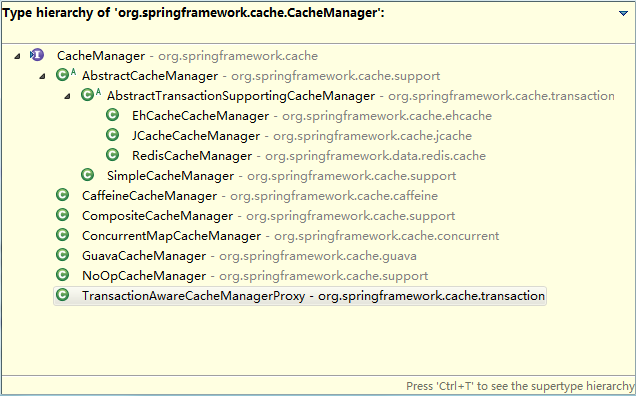spring boot集成redis缓存
spring boot项目中使用redis作为缓存。
先创建spring boot的maven工程,在pom.xml中添加依赖
<dependency>
<groupId>org.springframework.boot</groupId>
<artifactId>spring-boot-starter-web</artifactId>
<version>1.5.3.RELEASE</version>
</dependency>
<dependency>
<groupId>org.springframework.boot</groupId>
<artifactId>spring-boot-starter-redis</artifactId>
<version>1.3.8.RELEASE</version>
</dependency>
在application.properties中添加配置
server.port:9000 #服务启动的端口
spring.redis.database=0 #redis数据库的索引,默认为0
spring.redis.host=192.168.133.130
#spring.redis.password=
spring.redis.port=6379
spring.redis.pool.max-idle=8 #最大空闲链接数
spring.redis.pool.min-idle=0 #最小空闲连接数
spring.redis.pool.max-active=8 #连接池最大连接数,负数表示无最大连接数
spring.redis.pool.max-wait=-1 #连接池最大阻塞等待时间,负数表示没有
#spring.redis.sentinel.master= #主节点
#spring.redis.sentinel.nodes= #
spring.data.mongodb.host=192.168.133.130
spring.data.mongodb.port=27017
spring.data.mongodb.database=fzk
在启动类中添加注解
@SpringBootApplication
@EnableCachingpublic class Main {
public static void main(String[] args) throws Exception {
SpringApplication.run(Main.class, args);
}
}
@EnableCaching会为每个bean中被 @Cacheable, @CachePut and @CacheEvict修饰的public方法进行缓存操作。
缓存的用法
@Cacheable(value = "test", key = "'user_'.concat(#root.args[0])")
public User getUser(String userId) {
System.out.println("in getUser");
User user = new User();
user.setId(userId);
user.setPassword("passwd");
user.setUsername("username"); return user;
}
这个方法在userId相同形同的情况下,第一次调用的时候会执行方法,以后每次在调用的时候会读取缓存中的数据。
缓存的注解介绍:
@Cacheable
这个注解,会每次先检查是否执行过这个方法,在从缓存数据库中查看key是否相等,如果找到了,从缓存中读取,没有匹配的那么执行该方法,将结果缓存。
缓存都是通过key-value进行储存的,value或cacheNames必须指定(value是cacheNames的别名),指定多个value用(value = {"value1", "value2"})如果没有指定key,spring会提供一个默认的KeyGenerator,这个KeyGenerator根据参数生成key,如果方法没有参数返回KeyGenerator.EMPTY,如果有一个参数返回这个实例,如果有多个参数返回包含这些参数的SimpleKey。可以通过继承CachingConfigurerSupport自己指定KeyGenerator,类上加@Configuration注解。也可以像上面那样自己指定key,需要了解SPEL表达式。
多线程的情况下,可能同时会有多个线程同时进入一个没被缓存过的方法,这样会导致多个线程都会执行一遍方法,sync="true"会将第一次计算返回值的这个方法lock,计算完成后将结果缓存
@Cacheable(value="foos", sync="true")
public Foo executeExpensiveOperation(String id) {...}
在某些情况下,可能并不想把结果进行缓存,可通过condition进行筛选
@Cacheable(value="book", condition="#name.length() < 32")
public Book findBook(String name)
上面的#root表示的是返回值,其他一些可用的参数(来自spring官网)

@CachePut
每次都会执行该方法,并将结果进行缓存。用法与@Cacheable用法一致。
@CacheEvict
用于将清空缓存,可以指定key, value, condition,这几个的用法与上面介绍的一致。key和condition可以为空,如果为空,表示用默认策略。
@CacheEvict(value="books", allEntries=true, beforeInvocation=true)
public void loadBooks(InputStream batch)
allEntries=true表示清空books下的所有缓存,默认为false,beforeInvocation=true表示是否在方法执行前就清空缓存,默认为false。
@Caching
可以包含上面介绍的三个注解,key-value分别对应(cachable=[@Cacheable], put=[@CachePut], evict=[@CacheEvict])
@Caching(evict = { @CacheEvict("primary"), @CacheEvict(cacheNames="secondary", key="#p0") })
public Book importBooks(String deposit, Date date)
@CacheConfig
是一个类级的注解
@CacheConfig("books")
public class BookRepositoryImpl implements BookRepository {
@Cacheable
public Book findBook(ISBN isbn) {...}
}
这样类下的每个方法的缓存都用的是books,还可以指定自定义的KeyGenerator和CacheManager。
自定义缓存注解
通过使用上面的注解作为元直接实现自定义注解
@Retention(RetentionPolicy.RUNTIME)
@Target({ElementType.METHOD})
@Cacheable(value="books", key="#isbn")
public @interface SlowService {
}
这样我们就可以直接使用@SlowService作为注解
@SlowService
public Book findBook(ISBN isbn, boolean checkWarehouse, boolean includeUsed)
与下面的注解功能相同
@Cacheable(cacheNames="books", key="#isbn")
public Book findBook(ISBN isbn, boolean checkWarehouse, boolean includeUsed)
还有一点上面没说到的是spring用CacheManager管理缓存
这里用到的redis,所以肯定是用的RedisCacheManager,同样,我们也可以重新配置一下RedisCacheManager,在这里我们也可以配置一些参数,例如过期时间等等。
上面说到过默认的key生成器,我们同样可以定义自己的KeyGenerator,下面是实现
import java.lang.reflect.Method; import org.springframework.cache.CacheManager;
import org.springframework.cache.annotation.CachingConfigurerSupport;
import org.springframework.cache.interceptor.KeyGenerator;
import org.springframework.context.annotation.Bean;
import org.springframework.context.annotation.Configuration;
import org.springframework.data.redis.cache.RedisCacheManager;
import org.springframework.data.redis.connection.RedisConnectionFactory;
import org.springframework.data.redis.core.RedisTemplate;
import org.springframework.data.redis.core.StringRedisTemplate;
import org.springframework.data.redis.serializer.Jackson2JsonRedisSerializer; import com.fasterxml.jackson.annotation.JsonAutoDetect;
import com.fasterxml.jackson.annotation.PropertyAccessor;
import com.fasterxml.jackson.databind.ObjectMapper; @Configuration
public class RedisConfig extends CachingConfigurerSupport { @Bean
public KeyGenerator wiselyKeyGenerator() {
return new KeyGenerator() {
@Override
public Object generate(Object target, Method method, Object... params) {
StringBuilder sb = new StringBuilder();
sb.append(target.getClass().getName());
sb.append(method.getName());
for (Object obj : params) {
sb.append(obj.toString());
}
return sb.toString();
}
}; } @Bean
public CacheManager cacheManager(@SuppressWarnings("rawtypes") RedisTemplate redisTemplate) {
RedisCacheManager cacheManager = new RedisCacheManager(redisTemplate); return cacheManager;
}
}
生成CacheManager用到的RedisTemplate同样可以自定义,这个主要是与redis数据库连接用的
spring boot集成redis缓存的更多相关文章
- (35)Spring Boot集成Redis实现缓存机制【从零开始学Spring Boot】
[本文章是否对你有用以及是否有好的建议,请留言] 本文章牵涉到的技术点比较多:Spring Data JPA.Redis.Spring MVC,Spirng Cache,所以在看这篇文章的时候,需要对 ...
- Spring Boot 2.X(六):Spring Boot 集成Redis
Redis 简介 什么是 Redis Redis 是目前使用的非常广泛的免费开源内存数据库,是一个高性能的 key-value 数据库. Redis 与其他 key-value 缓存(如 Memcac ...
- SpringBoot(十一): Spring Boot集成Redis
1.在 pom.xml 中配置相关的 jar 依赖: <!-- 加载 spring boot redis 包 --> <dependency> <groupId>o ...
- spring boot集成redis基础入门
redis 支持持久化数据,不仅支持key-value类型的数据,还拥有list,set,zset,hash等数据结构的存储. 可以进行master-slave模式的数据备份 更多redis相关文档请 ...
- Spring Boot 结合 Redis 缓存
Redis官网: 中:http://www.redis.cn/ 外:https://redis.io/ redis下载和安装 Redis官方并没有提供Redis的Windows版本,这里使用微软提供的 ...
- Spring Boot自定义Redis缓存配置,保存value格式JSON字符串
Spring Boot自定义Redis缓存,保存格式JSON字符串 部分内容转自 https://blog.csdn.net/caojidasabi/article/details/83059642 ...
- 【spring boot】【redis】spring boot 集成redis的发布订阅机制
一.简单介绍 1.redis的发布订阅功能,很简单. 消息发布者和消息订阅者互相不认得,也不关心对方有谁. 消息发布者,将消息发送给频道(channel). 然后是由 频道(channel)将消息发送 ...
- SpringBoot入门系列(七)Spring Boot整合Redis缓存
前面介绍了Spring Boot 中的整合Mybatis并实现增删改查,.不清楚的朋友可以看看之前的文章:https://www.cnblogs.com/zhangweizhong/category/ ...
- spring boot集成redis实现session共享
1.pom文件依赖 <!--spring boot 与redis应用基本环境配置 --> <dependency> <groupId>org.springframe ...
随机推荐
- java 搭建web项目
从git到maven都是莫名其妙的装上了.... 然后看了下报错,是数据的事,把链接字符串一改,数据库一建,ok,跑起来了 基本上没任何问题,唯一的问题就是我的网速太慢,maven了一夜的样子....
- Extjs5 app.js缓冲设置
在6月2日Extjs5正式版公布后.粗略研究了一下,sencha推荐使用project编译来公布应用.开发过程中用sencha app watch命令就可以生成服务.每建立一个js类,就须要Ctrl+ ...
- Openstack(Kilo)安装系列之Keystone(三)
安装配置 Before you configure the OpenStack Identity service, you must create a database and an administ ...
- Linux USB 鼠标输入驱动具体解释
平台:mini2440 内核:linux 2.6.32.2 USB设备插入时.内核会读取设备信息,接着就把id_table里的信息与读取到的信息做比較.看是否匹配,假设匹配.就调用probe函数. U ...
- (一)Spring容器相关操作
一.spring事件 spring的事件有如下两个成员. 1.ApplicationEvent,容器事件,由容器发布 2.ApplicationListener 监听器,可以由容器中的任何监听器Bea ...
- JavaScript------如何解决表单登录信息输入为空显示提示
<form name="fname" method="post" action="../Home/Login" onsubmit=&q ...
- 如何让VS检查函数和类Comment的添加情况
问题: 现在有一个大的项目,我不能确定是否每个类和函数是否已经加上了comments,是否每个comments都是标注正确的. VS中有没有检查Comments的功能? 解决方案: 1.右击proje ...
- 面试之Java持久层(十)
91,什么是ORM? 对象关系映射(Object-Relational Mapping,简称ORM)是一种为了解决程序的面向对象模型与数据库的关系模型互不匹配问题的技术: 简单的说,O ...
- poj万人题
poj提交数量过万的题,除了水爆了的题就是无比经典的,不得不刷的题. 准备将poj上提交次数过万的题刷个遍. 持续更新中... poj 2828(线段树) 此题乃是Zhu, Zeyuan神牛出的,拿到 ...
- Less-@import 导入选项
//@import 导入选项 --@import 可以至于任何你需要导入的地方 在标准的CSS,@import在规则必须先于所有其他类型的规则.但Less.js不关心 example: .test() ...
